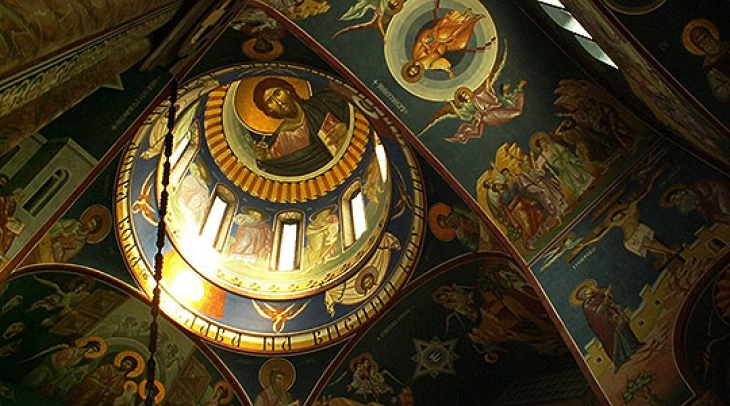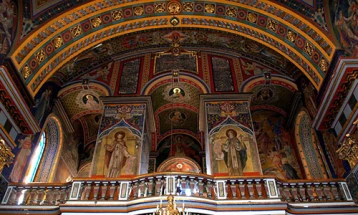Religious calendars
- The son of Jonah and brother of Andrew the First-Called, of the tribe of Simeon and the town of Bethsaida, he was a fisherman and was at first called Simon, but the Lord was pleased to call him Cephas, or Peter (Jn 1:42).
- Post By Ivan Kolekevski
- 08:01, 12 July, 2024

12 July 2024 (MIA)
Macedonian Orthodox Church Calendar
The Holy Apostle Peter
The son of Jonah and brother of Andrew the First-Called, of the tribe of Simeon and the town of Bethsaida, he was a fisherman and was at first called Simon, but the Lord was pleased to call him Cephas, or Peter (Jn 1:42). He was the first of the disciples to give clear expression to his faith in the Lord Jesus, saying: ‘Thou art the Christ, the Son of the living God’ (Mt. 16:16). His love for the Lord was very strong, and his faith in Him went from strength to strength. When the Lord was put on trial, Peter denied Him three times, but it needed only one look into the face of the Lord, and Peter’s soul was filled with shame and repentance. After the descent of the Holy Spirit, Peter became a fearless and powerful preacher of the Gospel. After his first sermon in Jerusalem, about 3,000 souls were converted to the Faith. He preached the Gospel throughout Palestine and Asia Minor, in Italy and in Illyria. He performed many wonders, healing the sick and raising the dead, and even his shadow had the power of healing the sick. He had a major struggle with Simon the Magician, who declared himself to be from God but was actually a servant of the devil. He finally put him to shame and overcame him. Peter was condemned to death on the order of the wicked Emperor Nero, a friend of Simon’s. After installing Linus as Bishop of Rome and exhorting and encouraging the flock of Christ there, Peter went to his death with joy. When he saw the cross before him, he asked the executioner to crucify him upside-down, because he felt himself to be unworthy to die in the same way as his Lord. And so this great servant of the greatest Master went to his rest and received a crown of eternal glory.
The Holy Apostle Paul
Born in Tarsus and of the tribe of Benjamin, he was formerly called Saul and studied under Gamaliel. He was a Pharisee and a persecutor of Christians. The Lord wondrously converted him to the Christian faith Himself, who appeared to him on the road to Damascus. He was baptised by the Apostle Ananias, named Paul and enrolled in the work of the Great Apostles. He preached the Gospel everywhere with burning zeal, from the borders of Arabia to the land of Spain, among both the Jews and the heathen, and receiving the title of `the Apostle to the Gentiles’. His fearful sufferings were matched only by his superhuman endurance. Through all the years of his preaching, he hung from day to day like a thread between life and death. Filling his days and nights with toil and suffering for Christ, organising the Church in many places and reaching a high level of perfection, he was able to say: `I live; yet not I but Christ liveth in me’ (Gal. 2:20). He was beheaded in Rome in the reign of Nero, at the same time as St Peter.
Catholic Calendar
St. John Gaulbert, Abbot
Saint John Gaulbert, Abbot – The city of Florence gave to the world Saint John Gaulbert. Although he enjoyed the benefits of an early Christian education, his youthful heart was soon attracted to the vanities of the world. A painful incident was the means God made use of, to open his eyes. Hugo, his only brother, had been murdered and St. John had resolved to avenge his death. On a certain Good Friday he met his enemy in a place where there was no escape for the latter. St. John drew his sword and would have killed his adversary on the spot, but the latter threw himself on his knees begging him by the passion of Jesus Christ to spare his life. St. John was touched at the words, embraced his enemy, entered a church and prayed with many tears for the pardon of his sins. He now entered the Order of St. Benedict, in which he made such great progress in virtue that after the death of the Abbot, the monks wished to impose this dignity upon him, but the Saint absolutely refused to accept it. Sometime later, he left the monastery with one companion in quest of greater solitude. Having visited the hermitage of Camaldoli, he finally settled at Valle Ombrosa in Tuscany. Together with two hermits whom he found there, he and his companions built a small monastery, observing the primitive rule of St. Benedict. Thus was laid the foundation of the Order of Vallombrosa. The humility of the saint was such that he would never be promoted, even to Minor Orders. His charity for the poor caused him to make a rule that no indigent person should be sent away without an alms. He founded several monasteries, reformed others, and succeeded in eradicating the vice of simony from the part of the country where he lived. He died on July 12, 1073, at about 80 years of age.







